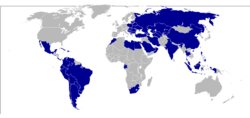新興国
Appearance
Japanese
[edit]

| Kanji in this term | ||
|---|---|---|
| 新 | 興 | 国 |
| しん Grade: 2 |
こう Grade: 5 |
こく Grade: 2 |
| on'yomi | ||
| Alternative spelling |
|---|
| 新興國 (kyūjitai) |
Etymology
[edit]Compound of 新興 (shinkō, “burgeoning, rising”) + 国 (koku, “country”).[1]
Pronunciation
[edit]Noun
[edit]新興国 • (shinkō koku)
- emerging country, newly industrialized country
- (dated) a newly independent country, no longer a colony
Usage notes
[edit]A country labeled as a 新興国 in Japanese could be deemed in English to be either an emerging country or a newly industrialized country, or even both, depending on the context.
The sense of no longer a colony is no longer used in modern contexts.
Related terms
[edit]- 先進国 (senshin koku): developed country
- 発展途上国 (hatten tojō koku): developing country
- 開発途上国 (kaihatsu tojō koku): developing country (less common synonym of 発展途上国)
- 低開発国 (tei kaihatsu koku): developing country (literally, “low-development country”)
- 後進国 (kōshin koku): developing country (less common; literally, “backward country”)
References
[edit]Categories:
- Japanese terms spelled with 新 read as しん
- Japanese terms spelled with 興 read as こう
- Japanese terms spelled with 国 read as こく
- Japanese terms read with on'yomi
- Japanese compound terms
- Japanese terms with IPA pronunciation
- Japanese lemmas
- Japanese nouns
- Japanese terms with multiple readings
- Japanese terms spelled with second grade kanji
- Japanese terms spelled with fifth grade kanji
- Japanese terms with 3 kanji
- Japanese dated terms

